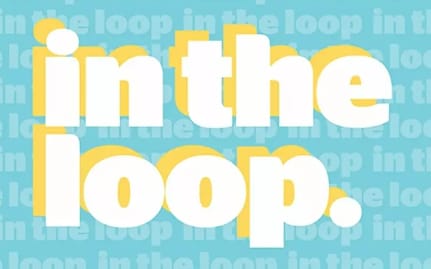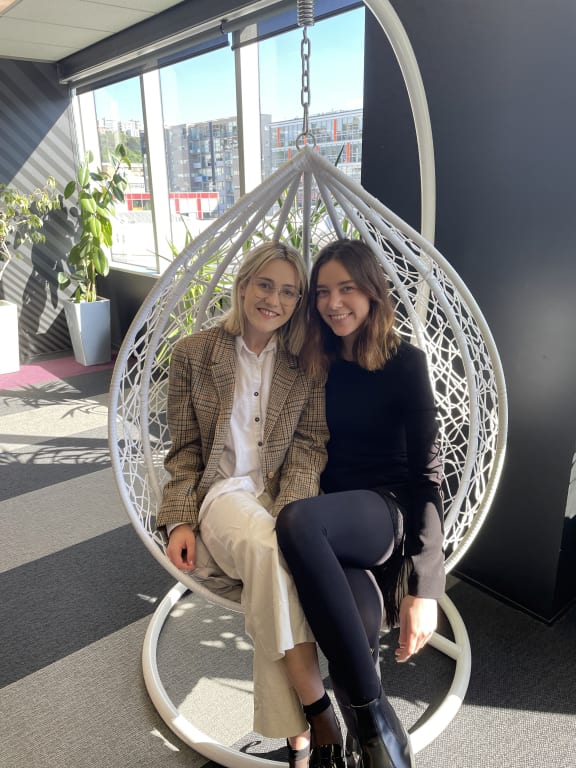Younger Kiwis have been turning away from traditional news media outlets and bulletins for years, and the media they’re using most heavily have little news. But podcast listening is growing fast among the young, and two journalists have created a new one to bring news to their peers.

Photo: supplied
One of the tasks of the government’s new ‘fit for the future’ public media entity is to reach more of the audiences under-served by public media at the moment. Prominent among them - younger Kiwis.
But that will be easier said than done - especially when it comes to news and current affairs.
These days they get more of their news via social media and messaging apps - and it’s often swamped with all sorts of non-news content vying for their attention.
But that doesn’t mean they’re not interested - and efforts to engage them on the services they use heavily can cut though.
A rapid-fire Guardian video on TikTok explaining the Taliban taking over in Afghanistan last year was viewed more than 5 million times.
But most news stories require a bit more time to explore in detail - and this is where podcasts come in handy.
NZ on Air’s most recent survey found younger New Zealanders heavily use streaming video services - like Netflix - with almost no news content. But one in five aged 15-39 listened to podcasts daily in 2020. (Only 8 per cent of over-45s did).
And it’s a global trend too. A recent annual survey in the US by research group Edison found - less than half of spoken word audio listening was on the radio dial last year.
A Pew Research Center survey in July last year found a big jump in younger adults getting news from podcasts - and Edison also found the biggest increase is among the youngest listeners.
Spoken word listening more than doubled among those aged 13-24 over the same seven-year period and, according to Edison, they were spending twice as much time on podcasts than on radio.
“The next generation of spoken word listeners is listening on-demand from their smartphones. It is going to be hard to defy that trend,” the report concluded.
Two journalists working with that trend are New Zealand Herald Wellington reporter Katie Harris and former Newshub reporter Rosie Gordon, the producer of Newstalk ZB’s show Wellington Mornings. until this week (now joining RNZ).

Katie Harris and Rosie Gordon, creators and hosts of NZME's news podcast 'In The Loop' Photo: supplied
Together they created the NZME podcast In The Loop six months ago to a look at “the headlines each week that matter to young New Zealanders.”
A single episode earlier this month included Newshub’s Lisette Reymer on reporting Ukraine’s war, a rise in the official cash rate, the latest IPCC report on climate change and the occupation of Parliament coming to an end.
In the section called Looping You In, they also reported on a Muslim student at a Dunedin high school who was racially abused and had her hijab ripped off. That sparked a campaign by a trainee teacher from Hamilton that went global and got superstar celebrity backing from Bella Hadid.
How do you put together a podcast all about the news for an audience that doesn’t tend to seek it out?
“There's so many great podcasts out there, but none of them are really targeting people in New Zealand that are my age - and speaking to people that are interested in the news but don't necessarily know all the nuts and bolts of every single issue,” Katie Harris told Mediawatch.
“Mainstream media companies cop flak from people online sometimes who say are the mainstream media aren't covering things, but much of they are. But stories are not presented in a way that young people can see - or they're not on the platforms that young people are normally on,” said Katie Harris.
“Young people that I know who are politically engaged, they're interested in what is going on in the news, but they perhaps only access the news on Instagram and Facebook,” said Rosie Gordon.
“The podcast is really a conversation between two colleagues working in the news about what's happening in the news - and that tone of not talking down to them is really important,” she said.
“When we first launched it, we were doing \‘deep dive’ segments at the top of the show where we would do a big long interview at the beginning - then a rundown of the top stories after that,” Katie Harris said.
“The feedback from our younger audience was that they found that a little bit boring so we flipped the structure of the show late last year. Now do a rundown or ‘in-case-you-missed-it’ at the top of the show and then share some thoughts on it afterwards,” she said.
“Podcasting is now becoming the primary way where a lot of us will learn about global events. Younger people might not be driving to work as much as they used to or commute by public transport or walking. So instead of having that radio knob, they’re clicking into the phone and going on to the podcasting app and learning about the news that way,” she said.
“I can see this as a really big growth platform or growth area for news companies. We can capture a big range of people that historically haven't been well served,” said Rosie Gordon.
The Justice for Hoda campaign was one that would have resonated with younger people - but it was only fleetingly reported by mainstream media at a time when Covid and the occupation of Parliament hogged headlines.
“We saw that in the Otago Daily Times and in The Herald - but not necessarily being put in places where young people might access it," said Rosie Gordon.
“Often these stories only last a matter of hours but stories like that really do deserve more time and attention. On the podcast because we can dedicate 10 or 15 minutes to unpacking, looking into and trying to get some more voices in the ear on what's happened.”
Katie and Rosie are both in mainstream media organisations where journalists are usually discouraged from expressing how they feel in their work.
But in In the Loop they do explain if a story has moved them. Awkward?
“A first was a little bit difficult going from straight news. If it was something I was directly reporting on, it wouldn't really be appropriate,” said Katie Harris.
“But I feel like the commentary afterwards helps unpack the situation more and can help people understand it. Sometimes we will highlight different people's viewpoints that we might not necessarily agree with, but it's valid to include,” she said.
“I feel it's important to give some of our thoughts and maybe our critical thinking on an issue because I think it encourages the audience to think about their opinion,” Said Rose Gordon.
“I think it's it's a nice way humanise news and journalism as well. Because news reporters are people as well. We're not robots that can just speak about really dark and sad stories without having an emotional response. So I think it is powerful to be able to have that space to say how we feel if a story's affected us,” said Katie Harris.


